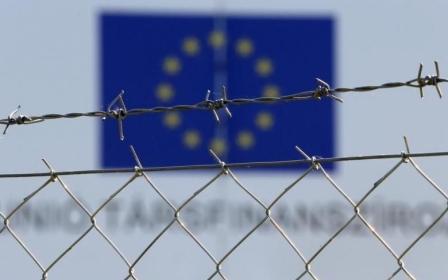Rights group warns over 'Orwellian' European counter-terror laws

The UK is leading a "race to the bottom" with "Orwellian" counter-terrorism laws, Amnesty International warned on Tuesday in a new report looking at the state of human rights in European Union member states.
The human rights organisation placed the UK at the extreme end of the spectrum for more than half of the areas of concern raised in the report, including measures on mass surveillance, the use of unreliable “diplomatic assurances” in order to deport people where there is a risk of torture, stripping people of their nationality, controlling their movements and detaining them without charge or sufficient legal process.
It also criticised the UK government’s Investigatory Power Act, the so-called "Snooper’s Charter", which it claimed would have "devastating consequences" for privacy and other human rights in the UK and beyond.
The publication of the report, titled "Dangerously Disproportionate: The ever-expanding national security state in Europe", follows the introduction of a raft of counter-terrorism measures among EU member states in the wake of a series of attacks on the continent claimed by the Islamic State (IS) group and continuing security concerns.
While governments had previously seen their role as "providing security so that people can enjoy their rights", the report said there had been a shift "to the view that governments must restrict people’s rights in order to provide security".
Based on more than two years' research in 14 EU countries, including the UK, Germany and France, the report said counter-terrorism measures had eroded the rule of law, enhanced executive powers, peeled away judicial controls, restricted freedom of expression and exposed everyone to unchecked government surveillance.
Special criticism was reserved for the state of emergency introduced by the French government after the November 2015 attacks by IS militants in Paris in which 130 people were killed.
'Violent and humiliating'
Citing research carried out last year, Amnesty said that less than one percent of the approximate 3,000 house searches conducted between November 2015 and February 2016 had resulted in a terrorism-related charge under French law, although it said hundreds of people including children had been charged with the "ill-defined and vague" offence of "apology of terrorism".
"Night searches, often violent and humiliating, and assigned residence, which hampers people’s ability to work and go to school, among other things, have traumatised hundreds of people," the report said.
It went on to chide the French government for attempting to expand the state of emergency to people not posing a security threat, among them people planning to protest against a proposed labour law, and environmental activists at the Paris Climate Conference in December 2015.
The report also described the UK's counter-terrorism laws as among the most "draconian" in Europe.
Rights watchdog hits back
Counter-terrorism legislation in the UK is scrutinised by an independent watchdog, currently David Anderson, who in his last report concluded that current powers were "broadly proportionate to the current threat".
In a tweet on Tuesday, Anderson described the Amnesty report's use of his own reports as "rather selective".
But Kate Allen, the director of Amnesty International UK, said: “The Big Brother surveillance state that George Orwell warned of back in 1949 is alive and dangerously well in Europe today. Governments, including the UK, are not far off creating societies in which freedom is the exception and fear the rule, which should be of deep concern to us all."
“After a series of horrific terrorist attacks across Europe, EU governments have rushed through a raft of repressive laws. There is an obvious and urgent need to protect people from this kind of violence – protecting the rights to life, and to live, move and think freely are essential tasks of government, but they are not ones to be achieved by any means and at the cost of such rights themselves.
"These laws trample on hard won freedoms that we have long taken for granted. The UK could have been a beacon of progress here, but instead it is leading a race to the bottom. Governments should be providing security for people to enjoy their rights, rather than restricting people’s rights in the name of security."
The UK's Home Office said in a statement: "The current terror threat to the UK is severe, meaning an attack is highly likely. It is therefore vital that our counter-terrorism laws are effective, but also fair and proportionate... We will vigorously defend these vital powers that help to keep our families, communities and country safe."
Stay informed with MEE's newsletters
Sign up to get the latest alerts, insights and analysis, starting with Turkey Unpacked
Middle East Eye delivers independent and unrivalled coverage and analysis of the Middle East, North Africa and beyond. To learn more about republishing this content and the associated fees, please fill out this form. More about MEE can be found here.




